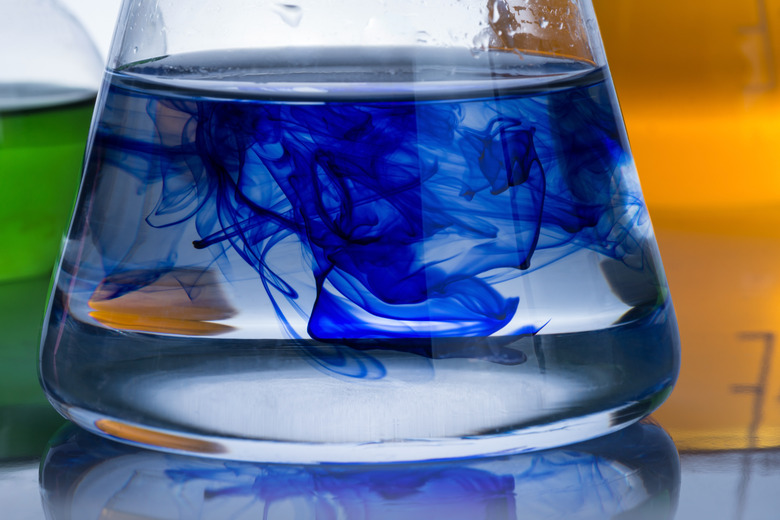What Are Spectator Ions?
Spectator ions are ions that are present in a solution but don't take part in a solution's chemical reaction. When reactants dissociate into ions, some of the ions may combine to form a new compound. The other ions don't take part in this chemical reaction and are therefore called spectator ions. They are in the solution but only "watch" as the other ions form new bonds to produce the new material.
TL;DR (Too Long; Didn't Read)
Spectator ions dissociate in a solution but don't participate when a chemical reaction takes place. Instead, they stay dissolved in the solution. Other ions in the solution may react and form bonds to produce a new compound but the spectator ions just observe. Typical spectator ions are the positive ions of the alkali metals in the first column of the periodic table and the halogens in the next to the last column.
Substances that Act as Spectator Ions
Substances that Act as Spectator Ions
Spectator ions come from ionic compounds that dissolve freely in water but don't react with it. As a result, when they stay in solution as individual ions rather than forming new compounds, they are known as spectator ions. The other ions from the compounds that dissolved are the ones taking part in the chemical reactions and producing new reaction products.
The alkali metals from the first column of the periodic table are one group of elements that provide spectator ions. Compounds with atoms such as sodium and potassium are ionic compounds whose ions dissociate in solution to form Na+ or K+ ions. A second group of elements that form spectator ions are the halogen gases from the second to last column of the periodic table. Atoms such as chlorine and fluorine form negatively charged ions Cl- and F-. After their ionic compounds dissociate in solution, these ions stay in solution without taking part in the resulting chemical reaction.
Examples of Spectator Ion Reactions
Examples of Spectator Ion Reactions
When a solution of sodium hydroxide, NaOH, is mixed with hydrochloric acid, HCl, the compounds dissociate into the ions Na+, OH-, H+ and Cl-. The hydrogen and hydroxide ions react to form water, but the sodium and chlorine ions stay in solution unchanged. They are spectator ions because they did not take part in the chemical reaction. If the water is removed, for example by evaporation, these two ions will form the crystals of the ionic compound NaCl, or table salt, but the ions themselves have not undergone any chemical change.
Ions that are spectator ions in one chemical reaction can take part in another reaction, depending on the materials placed into solution. For example, you add silver nitrate, AgNO3, to the above solution of Na+ and Cl- ions, silver chloride, AgCl, precipitates out in the form of a white deposit. In this case the chlorine ion has stopped being a spectator ion and taken part in the reaction to form a new compound, silver chloride. The sodium ion has remained a spectator ion and the nitrate ion, NO3-, is also a spectator ion.
While spectator ions remain unchanged in solution and don't take part in the chemical reaction, they serve as a means of delivery for the materials required for the reaction. To get silver chloride, the sodium ion delivers the chlorine ion while the nitrate ion delivers the silver ion into the reaction. Spectator ions bring in the participants for the chemical reaction but then don't take part themselves.
References
Cite This Article
MLA
Markgraf, Bert. "What Are Spectator Ions?" sciencing.com, https://www.sciencing.com/what-are-spectator-ions-13710222/. 27 March 2018.
APA
Markgraf, Bert. (2018, March 27). What Are Spectator Ions?. sciencing.com. Retrieved from https://www.sciencing.com/what-are-spectator-ions-13710222/
Chicago
Markgraf, Bert. What Are Spectator Ions? last modified August 30, 2022. https://www.sciencing.com/what-are-spectator-ions-13710222/
